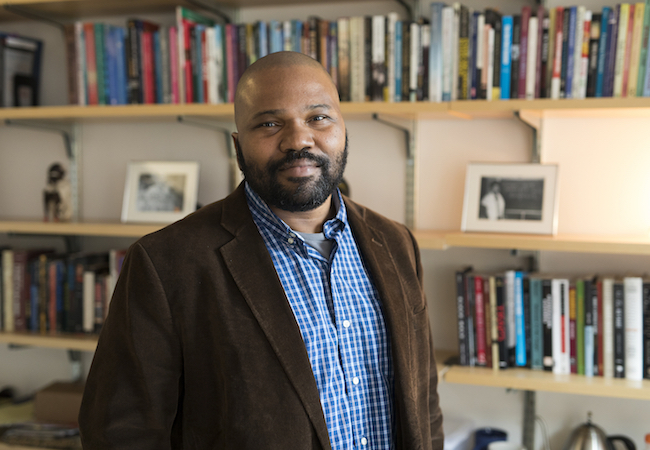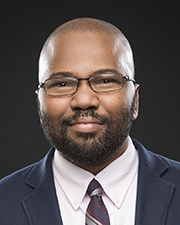Listening to the needs of Black male teachers

As Ed Brockenbrough interviewed Black male teachers, he felt like his research sessions were doubling as therapy for his subjects.
During the long and often emotional interviews, teacher after teacher would tell Brockenbrough that it was the first time anyone had asked them what it felt like to be a Black male teacher working in a predominantly Black urban school district in the northeast.
Their answers — which delved into expectations and realities around race, gender, speech patterns, sexuality, and more — helped shape Brockenbrough’s forthcoming book Black Men in Urban Teaching: Reassessing Black Masculinity.
“They shared a ton of amazing and inspiring and disheartening and spooky stories about what they negotiate on a daily basis,” Brockenbrough said. “The main goal of this book is to help a wide range of audiences understand the complexities of these men’s experiences.”
As a researcher and teacher-educator in Penn GSE’s Collaboratory for Teacher Education, Brockenbrough helps apprentice teachers navigate tough questions around identity, difference, and power in hopes of giving them the kind of foundation to examine their practice that many of the men in his study felt they needed.
“As a teacher-educator,” Brockenbrough said, “I have a knack for figuring out how to create a space where pre-service teachers can dive into those types of issues and figure out how they want to negotiate them in the classroom.”
It’s the sort of lesson that Brockenbrough says he could have used before he began his middle and high school teaching career in New York City. Like many Black male teachers, Brockenbrough said he felt there were expectations that he would be able to “save” Black children, and especially Black boys.
The weight of expectations
As he began his research career, he read a profile in a newspaper that described a Black male teacher performing “magic” in the classroom by connecting with Black students in ways other teachers couldn’t. The weight of those expectations came back to him.
“I remember thinking, what about when you have a kid who doesn’t have a father in his life and he wants to take it out on you? What about if you are a Black male teacher who isn’t hypermasculine? What if you quote-unquote ‘talk white’? Or what if you are gay and don’t fit the image people have of Black male teachers,” Brockenbrough said. “Or what if you are successful, and all of these responsibilities in the school get dumped on you, and you burn out?”
When he started interviewing teachers, he found he wasn’t alone.
Many of his interview subjects told Brockenbrough they were pushed to take on disciplinary roles. As he recounts in the book, one teacher told Brockenbrough that other teachers would routinely interrupt his math lessons with a knock on the door and the request that he stop his lesson and “deal with” a Black boy who had acted out in their class.
Brockenbrough also found some Black male teachers who were struggling with their own masculinity. While they had been built up as what researcher Amber Jean-Marie Pabon calls “Black Supermen” they were also working in schools where most of the other teachers and administrators were women. For some of these teachers, those gender roles were a continuing source of tension.
The need for systemic interventions
Then there were expectations that were simply unrealistic for any educator.
“There is a gap between what people perceive individual Black male teachers are capable of doing, and the realities of urban Black children’s economic and social miseries that are rooted in concentrated poverty, racism, and the prison-industrial complex and its impact on Black communities,” Brockenbrough said. “Those issues need to be addressed through policy level, institutional level, and structural level interventions, not just by individual Black male teachers.”
Brockenbrough, who earned his Ph.D. at Penn GSE and returned as a professor in 2017, is continuing to think about the development of Black male teachers. In addition to his ongoing research, he is working with organizations that are creating spaces where Black male educators can think through their practice and experiences, and identify challenges they are facing in a way that lets them articulate their need for support.
At Penn GSE and the Collaboratory, Brockenbrough is also working to make sure that teachers from all backgrounds are prepared in a way that gives them the tools to understand how to best serve their students.

